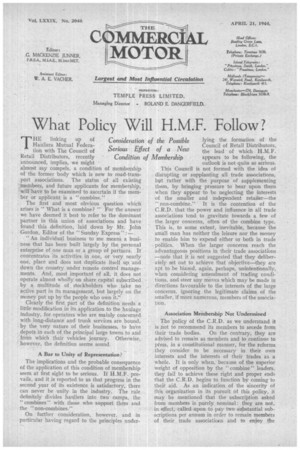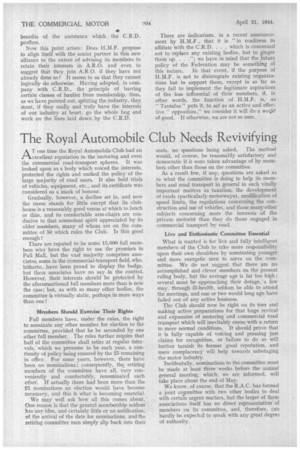What Policy Will H.M.F. Follow?
Page 15

Page 16

If you've noticed an error in this article please click here to report it so we can fix it.
THE linking up of Hauliers Mutual Federation with The Council of Retail Distributors, recently announced, implies, we might almost say compels. a condition of membership of the former body which is new to road-transport associations. The status of all existing • members, and future applicants for membership, will have to be examined to ascertain if the member or applicant is a "combine."
The first and most obvious question which arises is " What is a combine? " For the answer we have deemed it best to refer to the dominant partner in this union of associations and have found this definition, laid down by Mr. John Gordon, Editor of the "Sunday Express" :- "An individual business to me means a business that has been built largely by the personal • enterprise of one man or a group of partners. It concentrates its activities in one, or very nearly one, place and does not duplicate itself up and down the country under remote control managements. And, most important of all, it does not operate almost wholly on share capital subscribed by a multitude of stockholders who take no • active part in its management, but largely on the money put up by the people whO own it." Clearly the first part of the definition needs a little modification in its application to the haulage industry, for operators who are mainly concerned with long-distance and trunk services are bound, • by the very nature of their businesses, to have depots in each of the principal large towns to and from which their vehicles journey. Otherwise, however, the definition seems sound.
A Bar to Unity of Representation?
The implications and the probable consequence of the application of this condition of membership seem at first sight to be serious. If H.M.F. prevails, and it is reported to us that progress in the second year of its existence is satisfactory, there can never be unity in the industry. The rule definitely divides hauliers into two camps, the combines" with those who support them and the " non-combines."
• On further consideration, however, and in particular having regard to the principles under lying the formation of the Council of Retail Distributors, the lead of which H.M.F. appears to be following, the outlook is not quite so serious.
This Council is not formed with the idea of disrupting or supplanting all trade associations, bnt rather with the purpose of supplementing them, by bringing pressure to bear upon them when they appear to be neglecting the interests of the smaller and independent retailer—the " non-combine." It is the contention of the C.R.D. that the power and influence in all trade associations tend to gravitate towards a few of the larger concerns, often of the combine type. This is, to some extent, inevitable, because the small man has neither the leisure nor the money to enable him to expend either or both in trade politics. When the larger concerns reach the advantageous positions in their trade associations —note that it is not suggested that they deliberately set out to achieve that objective—they are apt to be biased, again, perhaps, unintentionally, when considering amendment of trading conditions, and steer any moves which may be made in directions favourable to the interests of the large concerns, ignoring the legitimate claims of the smaller, if more numerous, members of the association.
Association Membership Not Undermined The policy of the C.R.D. as we understand it is not to recommend its members to secede from their trade bodies. On the contrary, they are advised to remain as members and to continue to press, in a constitutional manner, for the reforms they consider to be necessary in their own interests and the interests of their trades as a whole. It is only when, because of the superior weight of opposition by the 'combine" leaders, they fail to achieve these right and proper ends that the C.R.D. begins to function by coming to their aid. As an indication of the sincerity of this organization in its pursuit Of this policy, it may be mentioned that the subscription asked from members is purely nominal: they are not, in effect, called upon to pay two substantial subscriptions per annum in order to remain members of their trade associations and to enjoy the benefits of the assistance which the C.R.D. proffers.
Now this point arises: Does H.M.F. propose to align itself with the senior partner in this new alliance to the extent of advising its members to retain their interests in A.R.O. and even to suggest that they join A.R.O. if they have not already done so? It seems to us that they cannot logically do otherwise. Having adopted, in company with C.R.D., the principle of barring certain classes of haulier from membership, thus, as we have pointed out, splitting the industry, they must, if they really and truly have the interests of our industry at heart, go the whole hog and work on the lines laid down, by the C.R.D. There are indications, in a recent announcement by H.M.F., that it is "in readiness to affiliate with the C.R.D. . which is concerned not to replace any existing bodies, but to ginger them up. . . ."; we have in mind that the future policy of the Federation may be something of this nature. In that event, if the purpose of H.M.F. is not to disintegrate existing organizations but to support them, except in so far as they fail to implement the legitimate aspirations of the less influential of their members, if, in other words, the function of H.M.F. is, as " Tantalus" puts it, to act as an active and effective " opposition," we consider it will do. a wo-cld of good. If otherwise, we are not so sure.




















































